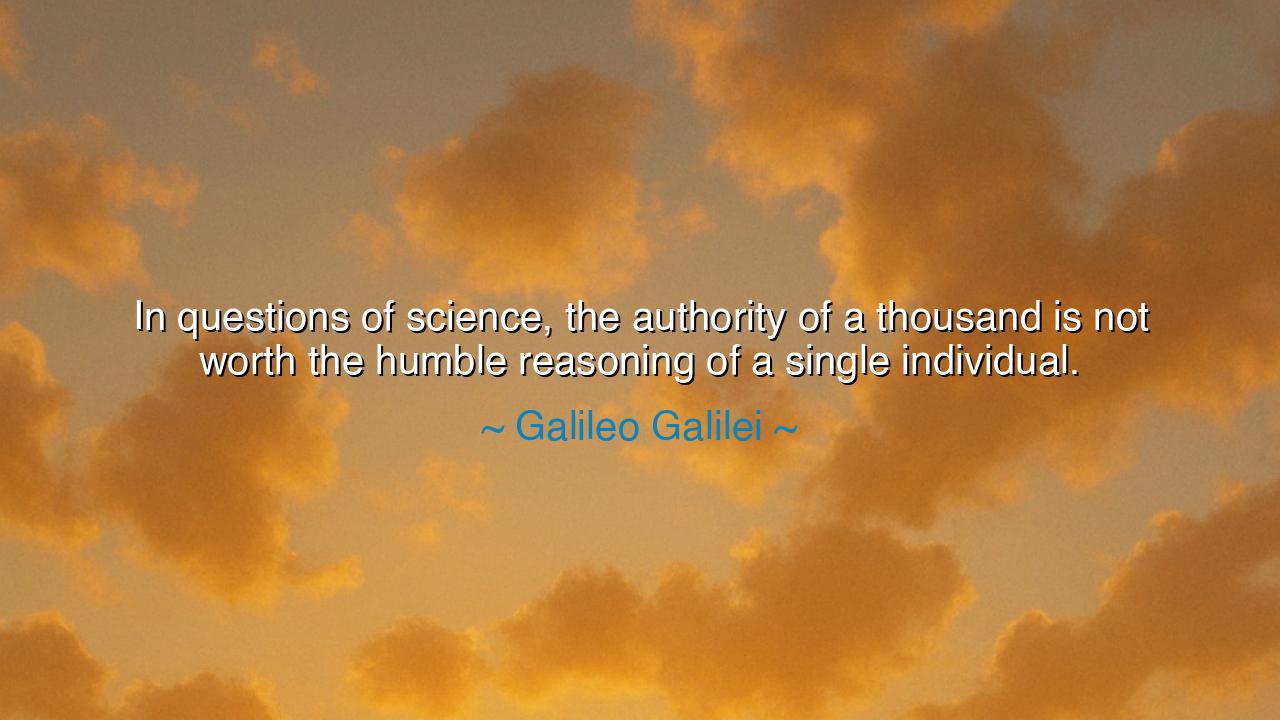
In questions of science, the authority of a thousand is not worth
In questions of science, the authority of a thousand is not worth the humble reasoning of a single individual.






“In questions of science, the authority of a thousand is not worth the humble reasoning of a single individual.” Thus spoke Galileo Galilei, the star-gazer of Florence, the rebel mind who dared to peer into the heavens and see what others refused to see. These words ring across the centuries like a clarion call, reminding us that truth is not secured by the weight of voices, nor by the grandeur of institutions, but by the quiet, steadfast reasoning of a mind unafraid to follow evidence wherever it leads. The authority of multitudes may roar like thunder, but the reasoning of one, guided by truth, shines like lightning in the dark.
The origin of this declaration lies in Galileo’s battle against entrenched dogma. The world of his time clung to the teachings of Aristotle and Ptolemy, declaring the Earth the center of all creation. The voices of church and scholars alike proclaimed this as unquestionable law. Yet Galileo, with his telescope and his courage, observed the moons of Jupiter, saw the phases of Venus, and declared that the heavens told a different story. In the face of the authority of a thousand, he chose the path of the lone seeker, and though threatened with trial and silence, he would not betray the evidence of his eyes.
His words embody the eternal struggle between conformity and truth. To lean on the authority of numbers is easy, for it gives comfort, it shields us from doubt, it allows us to follow without thinking. But true science is not the echo of the multitude; it is the song of the solitary who dares to ask, “What is real?” One candle, lit in the darkness, is worth more than a thousand shadows agreeing that night is endless. One mind, humble and persistent, is worth more than a council bound by pride and fear.
History offers us another mirror in the life of Ignaz Semmelweis, the physician who in the 1800s urged his fellow doctors to wash their hands to save mothers from death in childbirth. He had no grand authority, no host of voices to support him—only reasoning, evidence, and compassion. Yet the authorities scorned him, clung to their pride, and countless lives were lost. Only later was he vindicated, when germ theory arose and the world recognized the wisdom of the solitary voice. This is Galileo’s teaching made flesh: the authority of a thousand can kill, but the reasoning of one can save.
Let us not mistake humble reasoning for weakness. Humility here is not the absence of strength, but the courage to accept evidence without bending it to one’s pride. It is the humility to admit when one is wrong, to change course when truth demands it, and to stand firm even when mocked or condemned. This humility is the bedrock of discovery, for arrogance blinds, but humility allows the mind to see. Galileo himself bowed not to the roar of councils but to the quiet authority of truth written in the stars.
The lesson is timeless: do not be overawed by the crowd, nor silenced by the weight of voices. In your life, when faced with decisions, do not ask, “What do the many say?” but rather, “What does reason show? What does truth demand?” Authority may be wrong, tradition may falter, and even the wisest councils may err. But a single voice, guided by evidence, can change the course of history. The world may laugh at you today, but tomorrow it may rise upon the foundations of your courage.
Practical is the path before you: cultivate your mind as Galileo did. Question boldly, observe carefully, and reason humbly. Do not despise your own thoughts because they stand alone; do not worship the words of others simply because they are many. Build your life upon truth, tested and examined, not upon the fragile pillars of popularity. For the authority of a thousand may crumble, but the humble reasoning of one will endure, shining like a star in the firmament of time.






AAdministratorAdministrator
Welcome, honored guests. Please leave a comment, we will respond soon